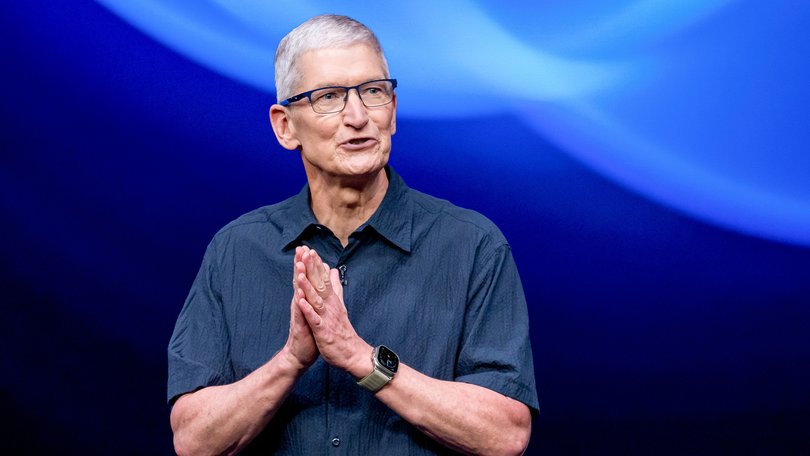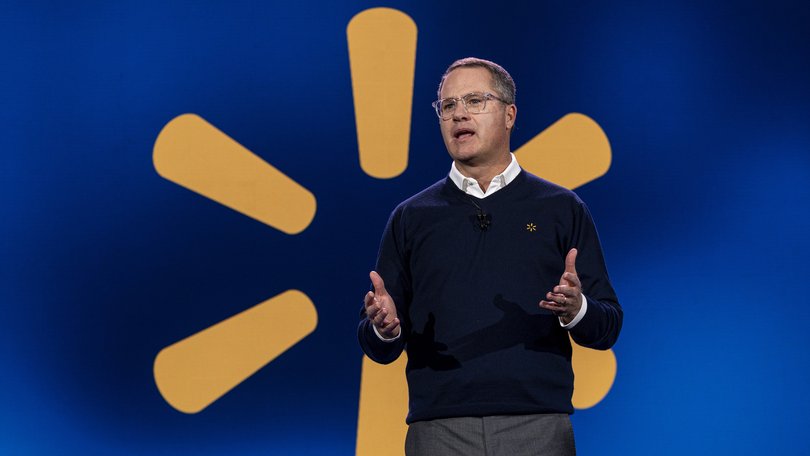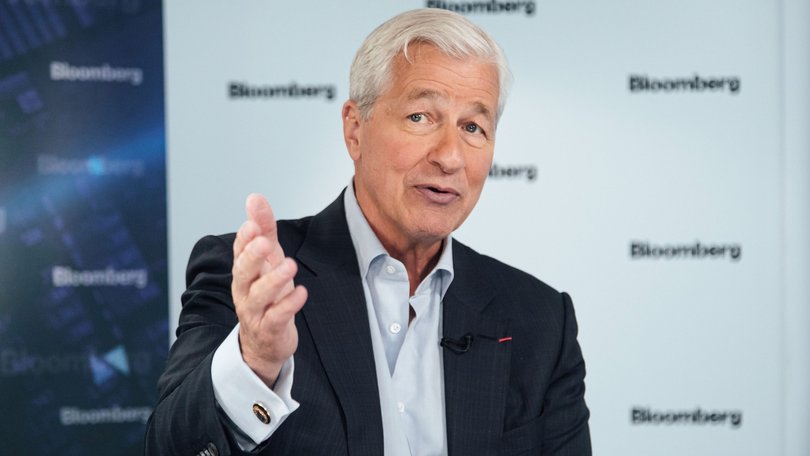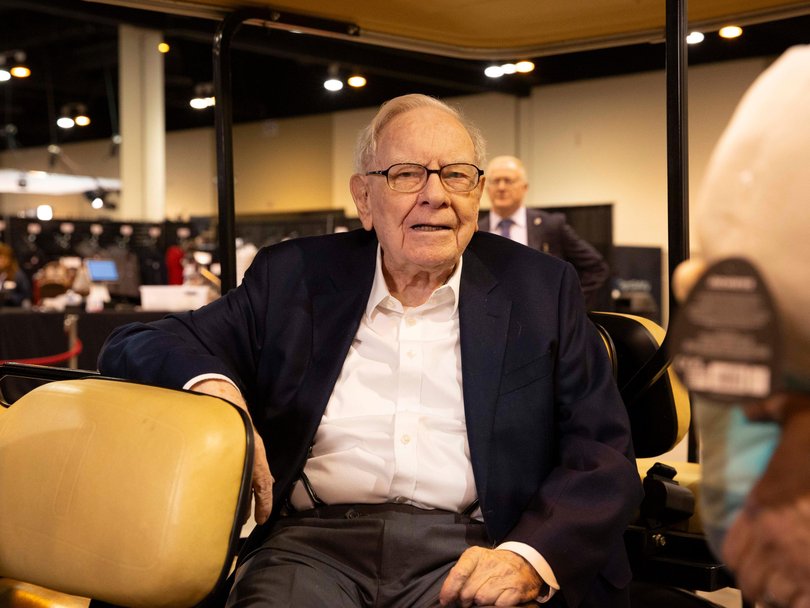THE ECONOMIST: How do you replace superstar CEOs like Tim Cook and Warren Buffett?
THE ECONOMIST: Corporate America will have some big shoes to fill, when CEOs step down.

Tim Cook seems like a nice problem for Apple’s board to have. Since he took over from Steve Jobs in 2011, the iPhone-maker’s boss has lifted annual sales from $US108 billion to $US416b ($646b), operating profit from $US34b to $US133b and market capitalisation from around $US350b to $US4 trillion, equivalent to roughly $US700 million for every day of his 14-year tenure.
Only Jensen Huang of Nvidia has created more shareholder value overall, but most of it in the past two frantic, AI-fuelled years.
Only Satya Nadella of Microsoft and Sundar Pichai of Alphabet, two big-tech counterparts, have generated more on the average day, but check again in a few years’ time, when their tenures match Mr Cook’s today.
Sign up to The Nightly's newsletters.
Get the first look at the digital newspaper, curated daily stories and breaking headlines delivered to your inbox.
By continuing you agree to our Terms and Privacy Policy.No CEO comes close to his record of producing nearly $US1t in cumulative net income.

This unrivalled performance does, though, come with a catch: how on earth do you replace someone like that?
Two years ago Mr Cook told Dua Lipa, a pop star with a podcast, that “I love it there and I can’t envision my life without being there. And so I’ll be there for a while.”
In recent days, however, the Financial Times hinted that this while may be shorter than expected, reporting that Mr Cook may stand down as early as next year.
Apple’s enviable finances mean the shoes he will leave his successor are comfortable — but also uncomfortably large.
Apple is not the only corporate giant preparing a peer to succeed someone widely regarded as peerless.
On November 14 Walmart announced that Doug McMillon, who has steered the world’s largest retailer through international expansion, a global pandemic and a digital reinvention, will in January hand over to the boss of its American business after nearly 12 years.

Days earlier Warren Buffett, an icon of America Inc, said he was “going quiet” ahead of his imminent retirement after six decades in charge of Berkshire Hathaway, a textile mill he has woven into a $US1t investment powerhouse.
Jamie Dimon, about to celebrate 20 years as head of JPMorgan Chase, the world’s most valuable bank, is no longer joking that his exit is five years away — and always will be.
Although the average tenure of an S&P 500 boss fell from 11 years in 2021 to eight in 2024, nearly one in five of the blue-chip index’s constituents is led by a “marathoner CEO” serving a decade or more.
Such companies tend to be more successful than average, with a typical market value of $US59b and total five-year shareholder returns (including dividends) of 93 per cent.
That is respectively twice and almost three times the median for the 200 or so firms whose bosses have been in place for three years or less. Naturally: otherwise the board would have looked for someone else.
Unsurprising, then, that when marathoners do finally hand over the baton, those selected to carry it often stumble.
An old headhunting adage goes:
You don’t want to be the person who follows the legend, you want to be the person who follows the person who follows the legend.
Or, indeed, the person after that.
It took GE 17 years and two failed attempts to find a worthy successor to Jack Welch, who led the industrial conglomerate for 20 years until 2001.
Nike is on its second flat-footed boss since Mark Parker’s tremendous leg from 2006 to 2020. It is too early to tell if Kelly Ortberg, appointed last year to lead Boeing, can pull the planemaker out of a prolonged nosedive following the departure in 2015 of its last successful pilot, James McNerney.
Successors do not have to be a disaster to be disappointing. Spencer Stuart, an executive-search firm, looked at marathoner-CEO succession in the S&P 500 between 2000 and 2024.
It found that 85 per cent of the replacements were company insiders, and that 66 per cent of those internal hires generated lower total returns than their predecessors, relative to the market. Worse, nearly half of the marathoners’ replacements, be they insiders or outsiders, actually trailed the S&P 500 as a whole on that measure.
How can companies minimise the chances of this undesirable reversion to the mean? First of all, they must take succession planning seriously.

Although most large firms have such plans on paper, in practice many boards merely pay them lip service. As self-serving as headhunters sound when they bang on about how the search for a next chief executive must start the moment the new one is redecorating the corner office, they are not wrong.
Paradoxically, the more that a board is hoping for both the current boss as well as the next one to be corporate endurance athletes, the sooner the search ought to begin.
That is because, as Jim Citrin of Spencer Stuart explains, in such cases a firm may need to skip past the C-suite and look to younger generations for candidates.
In contrast to the current senior executive team, rising stars will have plenty in the tank come the next transition a decade or more hence. But the striplings are also more numerous and less tested. Identifying promising ones is therefore easier if you start early, advises Mr Citrin.
Succession plans must also be constantly updated, particularly in times of rapid change.
“The right person three years ago might not be the right person today,” says Claudia Pici Morris of Korn Ferry, an executive-search consultancy.
Three years ago no one had heard of ChatGPT and globalisation was less of a dirty word.

No Cookalikes, please
Third, especially in volatile periods like today, boards ought to seriously consider those unpopular outsiders. Walmart is culturally wedded to internal succession and the insular Mr Buffett was always going to pick a confidant.
Apple looks poised to do the same. Yet it urgently needs to rethink its reliance on Chinese supply chains, belatedly devise an AI strategy and come up with a big new hit beyond the 18-year-old iPhone.
Mr Cook’s neglect of these challenges may be why Mr Buffett has been selling down Berkshire’s Apple stake and buying Alphabet shares. Mr Cook’s board should look for his successor farther from the tree.
Originally published as How do you replace a CEO like Tim Cook or Warren Buffett? Some shoes seem just too big to fill
